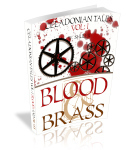Need a Fast Tip to Adding Flesh to a Character? Put Words in His Mouth:
Guest Post by Walter Shuler

Walter Shuler
I've never considered myself particularly adept at writing dialogue, but I've received several happy-making comments from readers and beta readers for both Blood and Brass and Gods of Sand and Stone that they enjoyed the various interactions between my characters, so maybe I'm not a complete hack. I won't lie – dialogue has always made me nervous. Perhaps the biggest reason I get the jitters is that dialogue is so crucial. It has to:
Further your story
Develop the characters
Engage the reader
Moreover, it has to do all that while still sounding natural. Good dialogue is more than just a plot advancement tool, though. It's vital for good character development. Without good dialogue, it doesn't matter how riveting or original your plot is. Good dialogue makes believable characters that draw your reader in.
The interactions between your characters not only flesh out the people that populate your fictional worlds in the minds of your readers, but they're windows on the way your world works. That's true whether you're writing the next sprawling heir to Tolkien's fantasy crown or a hard-boiled detective novel. Without good dialogue, your readers will eventually lose interest and leave.
Of course, "real" human dialogue can't be used in your writing. It just doesn't work. People communicate through so many cues, half-uttered grunts, grins, snorts, "umms", "yeahs" and slang words that using "real" dialogue in your writing would give your reader a migraine instantly. The problem then, is how do you create good dialogue that actually helps develop your characters and draw your reader into the world?
One of the best ways to help your characters leap off the page (at least as far as I'm concerned), is to give each one a slightly different manner of speaking. Of course, you can do that by using "accents" in your dialogue – dwarven brogue has always been one of my favorites – but be careful not to overdo it.

Blood and Brass is available NOW
Just as dropping the last letter of a word (doin') can make your characters seem a bit more realistic, this trick can also kill your reader's attention. No one wants to read paragraph after paragraph in that style, even if your character is from the Louisiana bayous. Here's an example from Gods of Sand and Stone. It's an interchange between Conn, one of the main characters, and the witch, Keera:
The hair rose on the back of Conn's neck as the blind girl stared directly at him with those unseeing eyes and gestured for him to enter. "Come in, come in. Don't stand about on principle. I've been expecting you – it took you longer than it should have."
Conn held his silence.
"Did you drag your feet much? Doesn't seem like you."
Keera watched him with an amused smile as he stood in her doorway. "Foolish boy, you'll find no tricks here. But come inside and you'll see for yourself." Gripping the haft of his spear tightly, Conn did as she bid.
Once inside, he broke his silence. "You're blind."
"Oh, quite the gift you have there! Hadn't noticed it myself."
"You make sport of me," he growled.
"Perhaps just a little. Poor Conn, were you expecting something different? A slavering monstrosity? Did you hope to catch me with a victim strapped to my table? I'm afraid I'm all out of sacrificial animals, but I can start on children and babes if you like. I've got a pen full of sacrifices waiting just out back, right next to the hemlock and dragon's bane!"
That might be an unfair example, as poor Conn only has three lines and Keera's a bit garrulous, but it serves to get the point across, I hope. You can use almost any tricks you want to give each character a unique voice, from profanity to favorite words, a penchant for speaking in clipped sentences or something else.
The other important bit of advice I can offer is this – listen to other people talk. Take whatever opportunity you can to listen to how they converse. In a way, people watching is secondary to people listening. You also need to spend time reading other authors and seeing how they handle dialogue. One my personal favorite authors for exactly this is Raymond Feist. Love him or hate him, he has a way of creating memorable characters that stay with you long after you put down the book. And that's what you want – characters that live and breathe in your readers' imagination. Good dialogue is the key to that.
-30-
Walter Shuler is a father, husband and fantasy writer. His debut book Celadonian Tales Vol: 1 Blood and Brass is now available through Amazon.com here: http://www.amazon.com/dp/B005LST00C. Gods of Sand and Stone is his second book, and the first volume in The God Wars trilogy. It will be available "soon".
You can connect with him on Twitter at: http://twitter.com/#!/anakronistical
Through Facebook at: http://www.facebook.com/hallalitriocht
And check in at his website here: http://hallalitriocht.com/
Filed under: guest blogging











